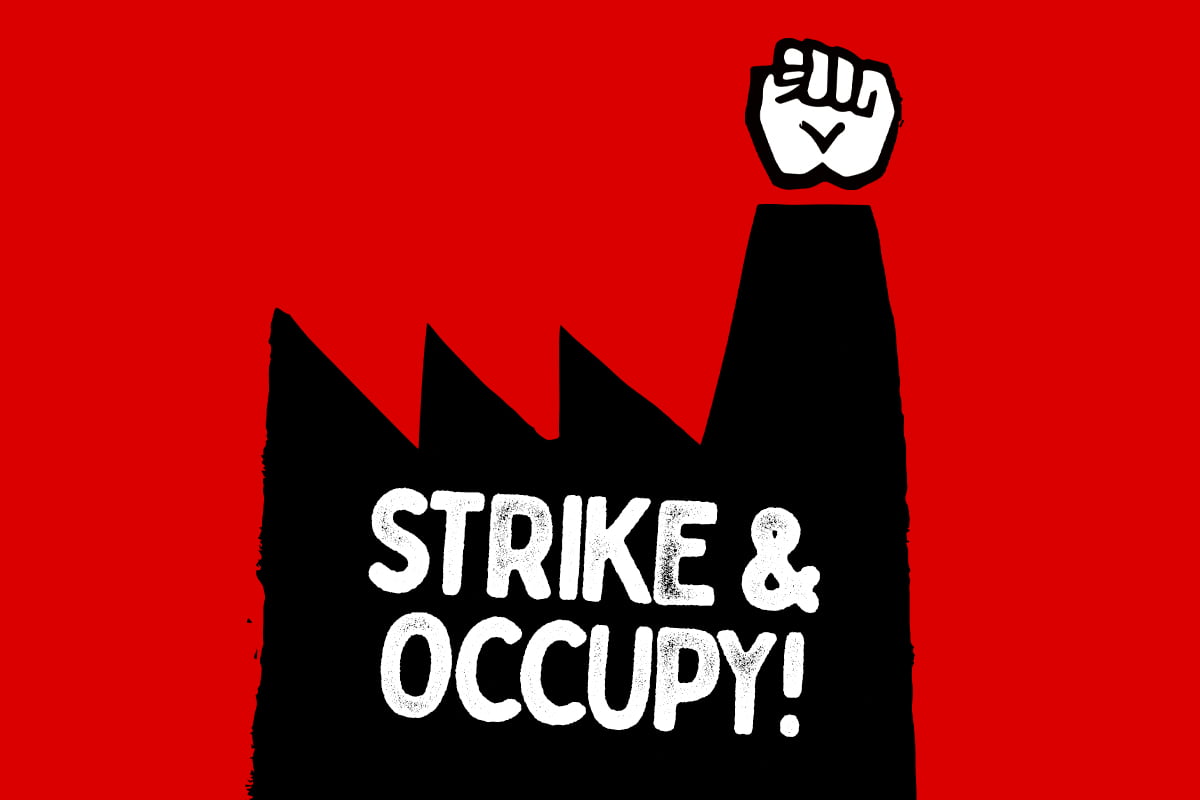A jobs massacre is currently unfolding in Port Talbot. 2,700 steelworkers are set to lose their jobs. This is despite the much-vaunted £500 million investment of Starmer’s Labour government.
But this is only the tip of an iceberg. Recent reports indicate that 3,000 more jobs are under threat at British Steel in Scunthorpe. And 400 workers are set for the chop at the Grangemouth refinery in Scotland.
The human impact of these cuts and closures will be disastrous. You only have to look at Britain’s already-deindustrialised areas – such as the South Wales Valleys or the towns of Northern England – to see what happens when industries are closed down without any plan for creating new jobs.
An epidemic of poverty, crumbling infrastructure, deprivation, addiction, and reduced life expectancy now awaits these towns. That is, unless the labour movement mobilises to prevent this.
Deindustrialisation

Deindustrialisation has hit Britain particularly hard. But it’s not unique to these shores. In fact, ‘rust belts’ can be seen in every major capitalist county – a product of the general instability of the capitalist system across the globe.
There is a wave of similar factory closures all over Europe. In Germany, thousands of workers’ jobs are under threat in key manufacturers such as Volkswagen and chemical giant BASF.
In Poland, tens of thousands of factory and office workers have lost their jobs this year: from employees in car and white-goods factories, to operators in the banks and postal service.
And similar trends can be seen in other key manufacturing countries across the world, particularly in the West.
Unable to make profits in these locations at the speed and scale that they would like, the capitalists instead look to countries like India when it comes to investing in production. In these places, the labour force can be more ruthlessly exploited.
Workers back in the old industrial powers, meanwhile, are thrown on the scrapheap.
Crisis
There are many reasons why this or that particular industry might close down. The underlying issue is capitalism’s contradiction of overproduction. The system’s ability to produce outstrips what the market can absorb.
Today, this ‘excess capacity’ can be seen in every key sector: from steel, to silicon chips, to smartphones. Due to the anarchy of capitalism, in which production is blindly guided by the ‘invisible hand’, not planned according to need, a glut of goods is saturating the world market.
Sooner or later, the intensifying pressure of competition forces the capitalists to cut back production. The least profitable industries are the first to suffer.
Due to decades of failure to invest and modernise by the capitalists, with money put into financial speculation rather than industry and infrastructure, British manufacturing has become the definition of unprofitable.
This chronic underinvestment led to much higher costs for UK industry, for instance. This is why Tata bosses are now closing down the blast furnaces in Port Talbot, while opening new ones in India.
It’s also why the same thing is happening at Grangemouth, where owners Petroineos are citing ‘daily losses’ as the reason they’re pulling out.
These decisions have got nothing to do with the need for a ‘green transition’, or any other such excuse. It’s about profit, plain and simple. If these vultures can make more profit by moving direct production elsewhere, they will do so. They don’t give a damn about the workers who get the sack.
One clear conclusion flows from this: the bosses’ insatiable appetite for profit is irreconcilable with the lives and livelihoods of the working class.
Talk

The trade union leaders, in the face of these existential threats to working-class communities, have deployed their favourite weapon: idle talk.
Union leaders have naively placed all their hopes in a Starmer Labour government, negotiating for state aid packages and for delays to the fatal day of closure. They’ve even held family fun days (!) to raise community support. But all of this has been for nothing.
The last thing we need now is more dithering.
The truth is that without the workers, the bosses could not make one penny or manufacture a single product. This potential strength of workers now needs to be harnessed and utilised. Workers must trust only in themselves.
Each of these struggles, however, cannot be left to fight it out in isolation. Atomised and divided, the bosses will pick each industry – and its workforce – off one by one.
In 2019, for example, the Belfast shipyard workers of Harland and Wolff carried out an occupation strike to save their jobs, receiving unanimous support from the community. But the unions failed to build upon this.
Fast forward to today, therefore, and the shipbuilder is again on the verge of going under. The company has been placed into administration, just as it was five years ago, and ‘non-core’ jobs are stated to be up for the axe.
To really stop jobs massacres like these, coordinated action is needed. An injury to one should mark the start of a fightback by all.
Militancy
These attacks should be met with coordinated strike action, movement-wide backup for any workers that choose to occupy their workplaces to prevent job losses and asset-stripping, and a huge campaign in the community to gather wider support.
Such a militant approach will horrify those at the tops of the union who hope for quiet life. But this is the only way to really put a stop to the deadly degradation of our class.
To organise and coordinate such a struggle, rank-and-file bodies should be elected and formed at a grassroots level. This would bring together workers to stand shoulder-to-shoulder, whatever union they are in.
This is the way to turn things around for the working class; to put workers in the driving seat, instead of having to constantly wage defensive struggles.
This is the bold programme that the Revolutionary Communist Party is fighting for, linked to the struggle to overthrow this decrepit capitalist system. Join us in this cause today.
Grangemouth refinery closure: The final slap in the face
RCP Scotland
Often, when the capitalists close a workplace and throw workers out on their elbows, they try to cover it up with an excuse or two. Petronieos, owners of Grangemouth refinery, run by infamous union-buster Jim ‘The Rat’ Ratcliffe, haven’t even bothered with that
Citing losses and the fact that easier profits can be made elsewhere, they’ve decided to pull the plug. Never mind that, on its website, the company boasts of a trading revenue of around $30 billion!
The site will no longer refine fuel, but instead act as a transport hub for it. That means 400 jobs will go, and the town of Grangemouth will suffer a body blow that it’ll be hard to recover from.
Unite officials at the site have described this move as a “kick in the teeth”.
No doubt the workers feel the same way. Like at Port Talbot, the union generally seems to have been hoping that either the SNP or Labour might do something to stop this from happening.
Once again, this has led to nothing, however. If we’re going to turn crises like these around in future, we need more than marches before the event and hand-wringing after.
Real militancy is needed – and the workers themselves are the only ones who can deliver it.






